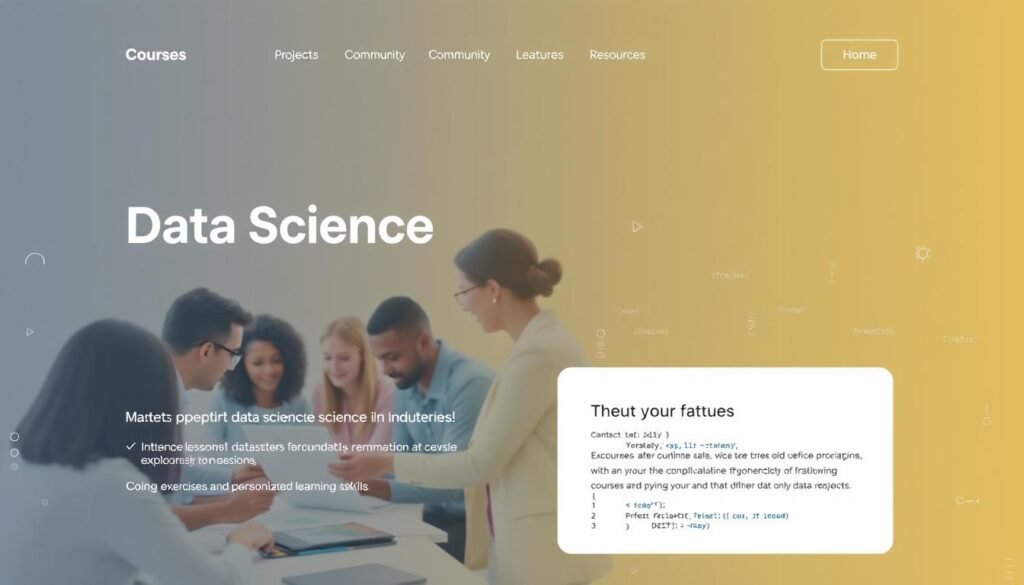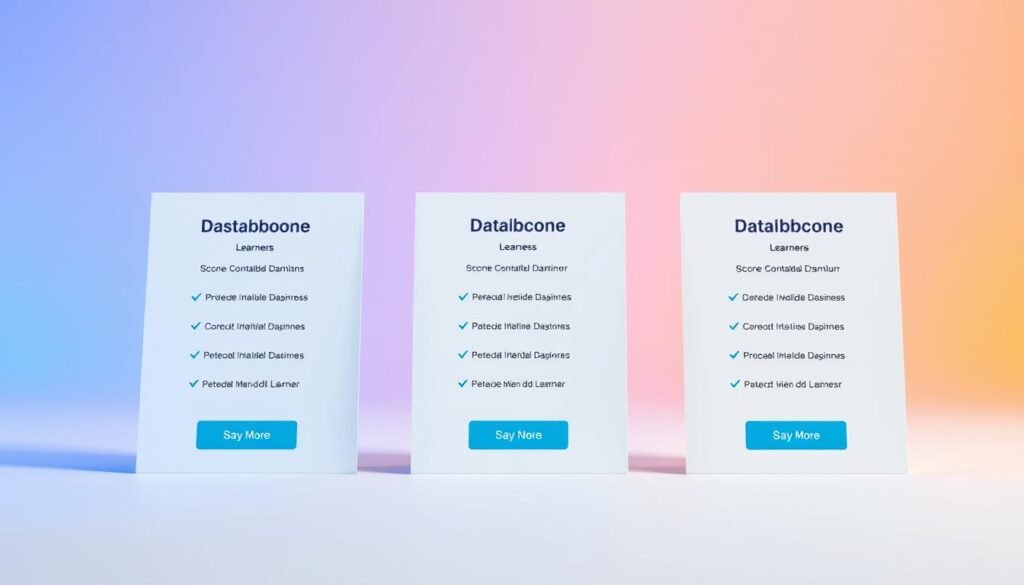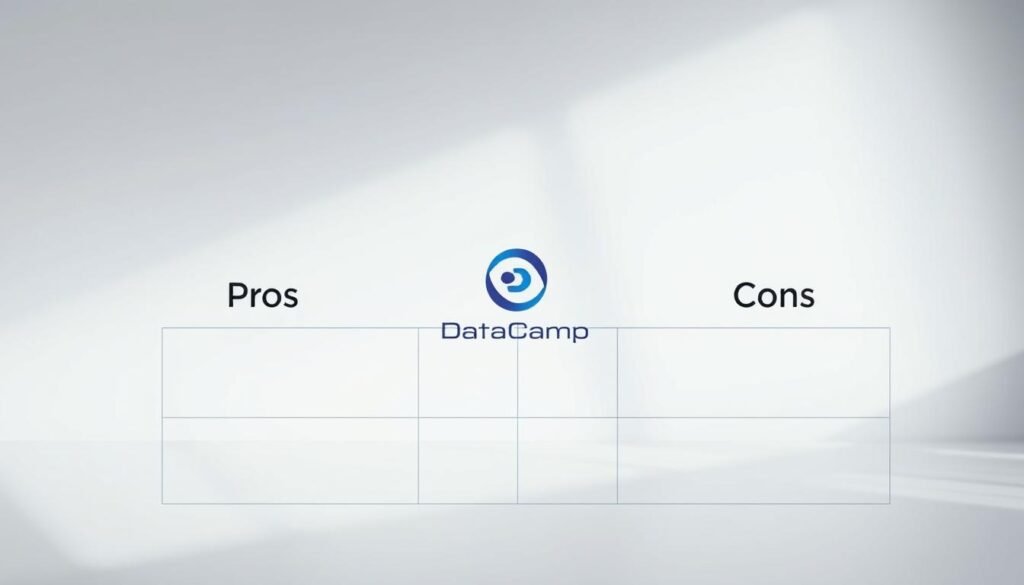Ever wondered how professionals master data science and programming without spending years in school? The answer lies in modern learning platforms that make complex skills accessible to everyone.
Founded in 2013, DataCamp has grown into a leading learning platform with over 500 courses and 16 million global learners. It specializes in Python, R, SQL, AI, and machine learning, helping users build in-demand skills efficiently.
The platform stands out with interactive lessons, real-world projects, and career-focused tracks. Recent updates like Dark Mode and improved onboarding make learning even smoother. Whether you’re starting in analytics or advancing your expertise, structured courses adapt to your level.
Key Takeaways
- Offers 500+ courses in data science and programming
- Interactive learning with Python, R, SQL, and AI
- Dark Mode and improved onboarding enhance user experience
- Trusted by 16 million learners worldwide
- Career-focused tracks for professional development
What Is DataCamp?
A Belgian startup revolutionized how people learn data skills online. Founded in 2013, this website began with a mission to simplify education in programming and analytics. Today, it serves millions with bite-sized, interactive lessons.

The platform’s four-phase approach ensures mastery:
– Learn through 5-minute video lessons.
– Practice with in-browser coding exercises.
– Apply skills to real-world projects.
– Assess progress with instant feedback.
Courses focus on computer languages like Python and R. Each module takes 2–4 hours, blending theory with hands-on tasks. Even beginners can explore topics risk-free—the first chapter of every course is free.
A UCLA student praised the method: “Short lessons fit my schedule. I gained skills faster than in traditional classes.” This testimonial highlights the platform’s focus on practical, adaptable education.
Key Features of DataCamp
Mastering data skills requires more than just theory—it demands interactive practice. This platform delivers with a blend of structured courses, AI-powered tools, and real-world projects. Whether you’re aiming for a promotion or a career switch, these features bridge the gap between learning and doing.

Interactive Courses and Skill Tracks
Career tracks guide learners from basics to job-ready expertise. Choose a 47-hour Data Analyst path or dive deeper with 94-hour machine learning tracks. Each includes:
- Video lessons with bite-sized coding challenges
- Practice datasets for data analysis and visualization
- Quizzes to reinforce key concepts
AI-Assisted Learning Tools
Stuck on a coding problem? The integrated ChatGPT feature suggests fixes in real time. Special courses also teach prompt engineering for machine learning workflows. One user noted: “The AI explanations helped me debug Python scripts faster than forums.”
Real-World Projects and Certifications
Build a portfolio with 70+ projects, like creating data visualization dashboards or deploying predictive models. Earn credentials in Power BI, Tableau, or AWS to validate your skills. A learner with 70+ hours of training shared: “The projects mirrored tasks from my dream job—I got hired within months.”
DataCamp Pricing Plans
Budget-friendly learning paths make mastering data skills accessible for everyone. The platform offers flexible tiers, from free basics to premium perks, ensuring learners find value at every level.

Free vs. Premium Tiers
New learners can get started with a free tier, which includes first-chapter access to all courses. For full library access, the premium plan costs $25/month or $149/year (student discount).
Premium unlocks unlimited practice, projects, and certifications. Over 16 million learners trust these tools for professional development.
Business and Enterprise Options
Teams pay $25/user monthly, while enterprises get custom pricing. Features include progress dashboards and tailored content creation.
A 14-day refund policy ensures satisfaction. Note: Mobile app reviews cite limited offline functionality.
Pros and Cons of Using DataCamp
Every learning platform has trade-offs—understanding them helps maximize your experience. While the content excels in structured skill-building, some users note gaps in preparing for production environments. This balanced look helps you optimize your learning journey.

Strengths: Accessibility and Structured Learning
The platform’s curated career paths simplify skill development. Interactive real-world projects and an XP motivation system keep learners engaged.
Mobile practice options make skill-building convenient. Over 300 hours of content cater to beginners and intermediate users alike.
Limitations: Hands-On Experience Gaps
Advanced data scientists may find limited local IDE integration challenging. A 44-course completer noted the absence of Git/CLI training.
Recent app updates improved UI, but production environment prep requires supplemental resources. The in-browser convenience contrasts with real-world deployment needs.
How DataCamp Compares to Alternatives
Choosing the right learning platform depends on your goals—here’s how top alternatives stack up. Each website excels in different areas, from university-backed credentials to hands-on coding labs.
DataCamp vs. Coursera
Coursera partners with universities, offering credits for some courses. Ideal for formal education seekers. DataCamp focuses on job-ready skills, with shorter modules for faster career transitions.
While Coursera’s certificates carry academic weight, DataCamp’s AI-powered tools provide instant coding feedback. Choose Coursera for degrees, DataCamp for practical coding mastery.
DataCamp vs. Codecademy
Codecademy emphasizes text-based website learning, great for pure programming. DataCamp integrates data analysis projects, blending courses with real datasets.
Both platforms teach Python and SQL. DataCamp’s skill tracks, however, align closer with analytics roles. Codecademy suits those prioritizing syntax over data science workflows.
DataCamp vs. Udacity
Udacity’s nanodegrees cost $249–$399/month, targeting advanced learners. DataCamp’s $25/month plan covers everything needed for foundational to intermediate skills.
Udacity shines with mentor-led projects, but DataCamp’s modular courses fit tighter schedules. Budget-conscious learners gain more value per dollar with DataCamp’s AI integrations.
Who Should Use DataCamp?
Data education isn’t one-size-fits-all—discover if this platform aligns with your goals. Designed for hands-on learners, it’s ideal for aspiring to become data analysts, career changers, and tech-curious students. A computational biology student shared: “The projects helped me apply Python data skills to research—landing my first lab internship.”
Career tracks for data analysts and engineers offer job-ready skills in months, not years. Teams also use it for upskilling—sales teams learn SQL to analyze customer trends faster.
Advanced machine learning engineers may need supplemental resources for production-level work. However, 82% of career-track completers report promotions or new roles within a year.
Want to learn code efficiently? This platform fits best for structured, project-driven learners—not those seeking theoretical depth or Ph.D.-level content.
Conclusion
Building in-demand data science skills requires the right tools and guidance. This platform excels with structured paths and AI-powered coding help, ideal for beginners in programming.
Users praise its career-ready projects—like a 44-course completer who landed a data analyst role. Yet, mobile limitations suggest pairing it with IDE practice for advanced work.
Think of it as a launchpad, not the full journey. The free trial lets you test Python or SQL basics risk-free.
Join 16 million learners transforming their learning into tangible skills. Start small, think big, and code your future.
FAQ
What is DataCamp best for?
It’s ideal for beginners and professionals looking to build data science, machine learning, or analytics skills through interactive lessons and real-world projects.
Does DataCamp offer free courses?
Yes, the platform provides a limited selection of free courses, but full access requires a premium subscription.
How does DataCamp compare to Coursera?
Unlike Coursera’s university-style programs, DataCamp focuses on hands-on coding exercises and faster skill-building for data careers.
Are DataCamp certifications recognized?
Certificates validate completed courses or tracks, but they’re not accredited. They’re useful for showcasing skills to employers.
Can I learn Python or R on DataCamp?
Absolutely. The platform offers beginner-to-advanced courses in Python, R, SQL, and other programming languages for data analysis.
Is DataCamp good for job preparation?
Yes, its career tracks and projects simulate real tasks for roles like data analyst or scientist, but supplementing with external practice is recommended.
What’s the cost of a premium subscription?
Plans start at .42/month (billed annually). Teams and enterprises get custom pricing for scalable learning solutions.
Does DataCamp support team learning?
Yes. Business plans include progress tracking, shared workspaces, and admin tools for organizations upskilling employees.






